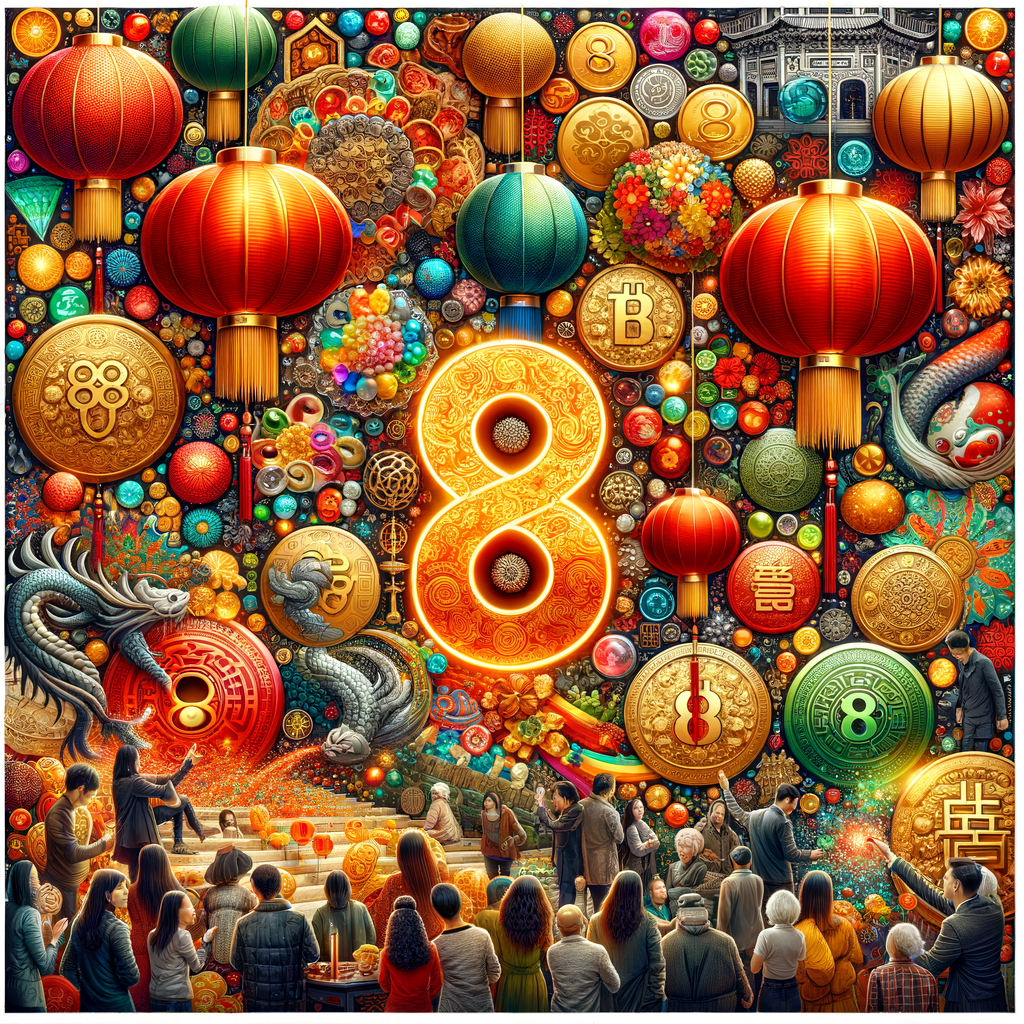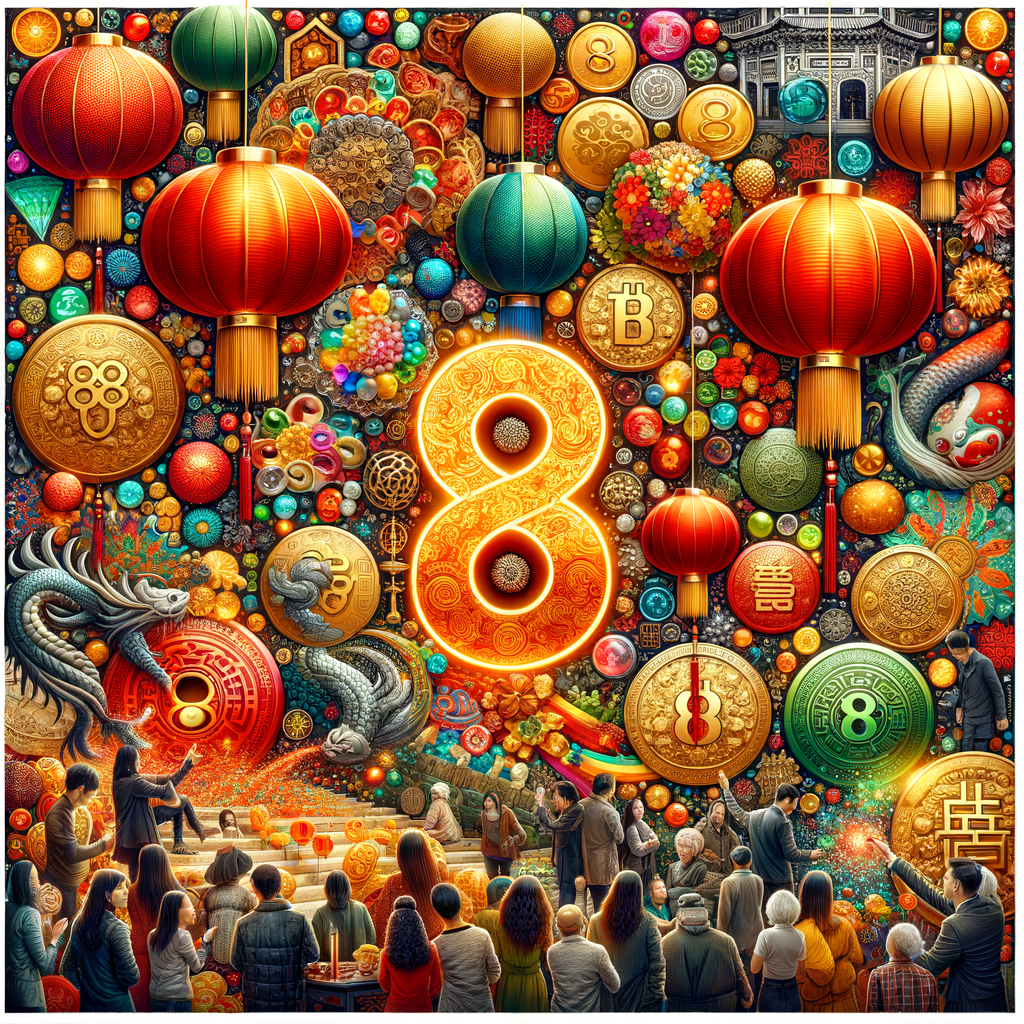
Introduction to Chinese Lucky Symbols
Chinese culture is rich and diverse, filled with a variety of traditions and beliefs. One such fascinating aspect is the use of lucky symbols. These symbols, deeply rooted in the culture, have been used for centuries to bring good fortune and ward off evil spirits. Let’s delve into the world of Chinese lucky symbols and understand their significance.
- Overview of Chinese Lucky Symbols
- Importance of these symbols in Chinese culture
Chinese lucky symbols come in various forms, including characters, numbers, animals, and objects. Each symbol carries a unique meaning and is believed to bring specific types of luck. For example, the number 8 is considered extremely lucky as it sounds like the word ‘wealth’ in Chinese. Similarly, the dragon is a powerful symbol of strength and good luck. Objects like the Chinese knot, which is often given as a gift, are also believed to bring good fortune.
The significance of these lucky symbols in Chinese culture cannot be overstated. They are not just mere decorations but are deeply intertwined with the beliefs and daily lives of the Chinese people. These symbols are often used during important events like weddings, birthdays, and festivals to bring good luck and prosperity. They are also commonly seen in homes and businesses to attract positive energy and ward off bad luck.
In the following sections, we will explore more about these symbols, their meanings, and how they are used in Chinese culture. We will also look at how you can incorporate these symbols into your life to bring good luck and positivity. So, let’s embark on this fascinating journey of understanding Chinese culture and luck.
Understanding Chinese Culture and Luck
Chinese culture is rich and diverse, with a deep-rooted belief in luck playing a significant role in shaping its traditions and practices. Let’s delve into the role of luck in Chinese culture from both a historical and modern perspective.
Role of Luck in Chinese Culture
- Historical Perspective of Luck in Chinese Culture
- Modern Interpretation of Luck in Chinese Society
The concept of luck has been integral to Chinese culture for thousands of years. Historically, the Chinese believed that luck was a divine gift bestowed upon individuals by the gods. This belief was deeply ingrained in their daily lives and influenced many aspects of their society, from architecture to agriculture.
For instance, the ancient Chinese used the concept of ‘Feng Shui’, a system of laws considered to govern spatial arrangement and orientation in relation to the flow of energy (Qi), to design their homes and cities. They believed that aligning their surroundings correctly would bring good luck and prosperity.
In modern times, the concept of luck continues to hold a significant place in Chinese society. However, the interpretation has evolved to align with contemporary beliefs and practices. Today, luck is often associated with hard work and perseverance. Many Chinese people believe that creating opportunities and making the most of them is a form of making your own luck.
Despite the modern interpretation, traditional beliefs in luck still persist. For example, certain numbers are considered lucky or unlucky based on their pronunciation in Chinese. The number 8, pronounced ‘ba’, sounds similar to ‘fa’, which means to make a fortune. Hence, it is considered a lucky number. Conversely, the number 4 is considered unlucky as it sounds like ‘si’, which means death.
Understanding the role of luck in Chinese culture provides a fascinating insight into the beliefs and values that have shaped this ancient civilization and continue to influence it today. Whether viewed as a divine gift or a result of hard work and opportunity, luck remains a key component of Chinese culture.
Chinese Superstitions and Beliefs
China, a country with a rich history and diverse culture, is home to a myriad of superstitions and beliefs. These beliefs, deeply rooted in Chinese culture, play a significant role in shaping the behaviors and attitudes of its people. Let’s delve into some of the most common Chinese superstitions and beliefs related to luck.
- Common Chinese Superstitions
- Number 4: In Chinese culture, the number 4 is considered unlucky because it sounds like the word for “death”. Therefore, it’s common to avoid this number in addresses, phone numbers, and room numbers.
- Red Color: Red is considered a lucky color in China. It is believed to bring good fortune and drive away evil spirits. That’s why you’ll often see red decorations during Chinese New Year and weddings.
- Chopsticks: It’s considered bad luck to stick chopsticks upright in a bowl of rice, as it resembles the ritual of incense burning that is associated with death and the ancestors’ worship.
- Beliefs Related to Luck in Chinese Culture
- Chinese Zodiac: The Chinese Zodiac, consisting of 12 animals, is believed to influence a person’s fortune for the year. Each year is associated with a different animal, and people often make decisions based on their zodiac animal’s luck predictions.
- Feng Shui: Feng Shui is an ancient Chinese practice of arranging the living space in a way to attract positive energy or ‘Chi’. It is believed that a good Feng Shui can bring good luck, health, and prosperity.
- Lucky Charms: Certain objects are considered lucky charms in Chinese culture. For example, the laughing Buddha is believed to bring wealth and happiness, while the dragon is a symbol of power and good luck.
Chinese culture is filled with superstitions that have been passed down from generation to generation. Here are a few common ones:
Chinese culture places a great emphasis on luck. Here are some beliefs related to luck:
In conclusion, Chinese superstitions and beliefs are deeply ingrained in the culture and daily lives of the Chinese people. Understanding these beliefs can provide a fascinating insight into the rich and diverse Chinese culture.
Incorporating Chinese Luck into Your Life
Chinese culture is rich with symbols and practices believed to bring good luck. Incorporating these elements into your life can be a fun and meaningful way to connect with this ancient culture. Let’s explore some popular Chinese lucky charms and how to use them.
Chinese Lucky Charms
Chinese lucky charms are often used to attract good fortune and ward off negative energy. They come in various forms, each with its own unique symbolism and significance.
- Popular Chinese lucky charms
- The Lucky Cat: Also known as Maneki-neko, this charm is believed to bring wealth and prosperity.
- The Red Envelope: Traditionally filled with money, these envelopes are given during holidays and special occasions to bring good luck.
- The Jade Plant: This plant is thought to attract wealth and prosperity, making it a popular choice for businesses and homes.
- The Dragon: A symbol of power, strength, and good luck, dragon charms are often used to ward off evil spirits.
- How to use these charms for good luck
- Placement: The location of your charm can influence its effectiveness. For example, a Lucky Cat should be placed in a prominent location to attract wealth.
- Respect: Treat your charm with respect. It’s not just a decoration, but a symbol of luck and prosperity.
- Belief: Believe in the power of your charm. The more you believe in its ability to bring good luck, the more likely it is to do so.
Here are some of the most popular Chinese lucky charms:
Using Chinese lucky charms is quite simple. Here are some tips:
Remember, these charms are not just about attracting good luck. They’re also a way to connect with Chinese culture and traditions. So, whether you’re looking for a bit of luck or a deeper cultural connection, consider incorporating these Chinese lucky charms into your life.
Chinese Luck Traditions
In the rich tapestry of Chinese culture, certain traditions are believed to attract good luck and fortune. Let’s explore some of these practices and see how they can be incorporated into daily life.
- Traditional practices for attracting luck
- Examples of incorporating these traditions into daily life
One of the most common practices is the use of lucky numbers. In Chinese culture, certain numbers are considered lucky because their pronunciation in Chinese sounds similar to words that have positive meanings. For example, the number 8 is considered very lucky because it sounds like the word for wealth.
Another popular tradition is the use of red color. Red is believed to bring good luck and is often used in decorations, clothing, and gifts during special occasions like Chinese New Year. The Chinese also believe in Feng Shui, an ancient art and science that was developed over 3,000 years ago in China. It is a complex body of knowledge that reveals how to balance the energies in any given space to assure health and good fortune for people inhabiting it.
These traditions can easily be incorporated into daily life. For instance, you can use lucky numbers when choosing a phone number, a house number, or even the date and time of an important event. You can also use the color red in your home decor or wear red clothing to attract good luck.
Practicing Feng Shui is another way to attract good fortune. This can involve arranging your home or office in a certain way, or using specific elements in your decor. For example, placing a water feature in the north of your home is believed to bring career opportunities, while placing a green plant in the east can promote good health.
Incorporating these Chinese luck traditions into your life doesn’t just bring potential good fortune, but also allows you to engage with a rich and ancient culture. So why not give it a try? You might just find yourself feeling luckier!
Lucky Things in China
In Chinese culture, certain things are believed to bring good luck and fortune. One of these is numbers. Let’s dive into the world of lucky numbers in Chinese culture.
Lucky Numbers in Chinese Culture
Numbers play a significant role in Chinese culture, with some numbers considered luckier than others. This belief stems from the way numbers sound when pronounced in Chinese, often similar to words with positive meanings.
- Explanation of lucky numbers in China
- How to incorporate these numbers into your life
The number 8, for example, is considered the luckiest number in Chinese culture. It is pronounced ‘ba’ in Chinese, which sounds similar to the word ‘fa’, meaning wealth or prosper. The Beijing Olympics in 2008 started at 8 seconds and 8 minutes past 8 pm on the 8th day of the 8th month, emphasizing the importance of this number.
Similarly, the number 9, pronounced ‘jiu’, is associated with longevity and eternity. It is often used in weddings to symbolize a lasting marriage. The number 6, pronounced ‘liu’, sounds like the Chinese word for ‘flow’ and is often used in business to wish smooth progress.
There are several ways you can incorporate these lucky numbers into your life. You could choose a phone number, a house number, or a car license plate number that contains these lucky numbers. When giving gifts, consider giving them in sets of 8 or 9. If you’re planning a special event, try to schedule it on a date that includes one of these lucky numbers.
Remember, while these numbers are considered lucky in Chinese culture, it’s always important to respect and understand the cultural context behind these beliefs. So, the next time you come across these numbers, you’ll know a little more about their significance in Chinese culture.
Lucky Colors in Chinese Culture
Colors play a significant role in Chinese culture. They are not only used for aesthetic purposes but are also deeply rooted in Chinese beliefs and traditions. Let’s explore the significance of different colors in Chinese culture and how you can use these colors to bring good luck into your life.
- Significance of Different Colors in Chinese Culture
- Ways to Use These Colors for Good Luck
- Red: Wearing red during celebrations, like the Chinese New Year, can bring good luck and ward off evil spirits.
- Yellow: Decorating your home or office with yellow can attract wealth and power.
- Green: Planting green plants in your home can promote growth and harmony.
- White: Wearing white during mourning periods can show respect and purity.
- Black: Using black in your home decor can bring power and mystery.
Each color in Chinese culture has a unique meaning and is associated with specific elements.
| Color | Meaning | Element |
|---|---|---|
| Red | Good luck, celebration, happiness | Fire |
| Yellow | Royalty, power, wealth | Earth |
| Green | Growth, harmony, freshness | Wood |
| White | Purity, innocence, mourning | Metal |
| Black | Power, mystery, fear | Water |
Understanding these color meanings can help you appreciate the depth of Chinese culture and its rich traditions.
Colors can be used in various ways to attract good luck in Chinese culture. Here are a few examples:
Remember, the use of colors should be appropriate to the situation and respectful of Chinese traditions.
In conclusion, colors in Chinese culture are more than just visual elements. They carry deep meanings and can be used to attract good luck. So, the next time you choose a color, remember its significance in Chinese culture.
Chinese Good Luck Practices
Feng Shui
-
Introduction to Feng Shui
Feng Shui, pronounced as ‘Fung Shway’, is an ancient Chinese practice that dates back over 3,000 years. It’s a system of arranging your surroundings in harmony and balance with the natural world. The words ‘Feng’ and ‘Shui’ mean ‘wind’ and ‘water,’ respectively, which are both associated with good health in Chinese culture. Feng Shui is not just about rearranging furniture; it’s a way of life that could bring positivity and good luck.
-
How Feng Shui can bring good luck
Feng Shui is believed to bring good luck by creating a balance of energies in your surroundings. It’s like a hidden force that connects everything in the universe. When you arrange your home or workspace according to Feng Shui principles, you allow positive energy, or ‘Chi,’ to flow freely. This energy can bring good luck, prosperity, and happiness.
For instance, a clutter-free home is a fundamental principle of Feng Shui. Clutter blocks the flow of Chi, leading to stagnation and bad luck. By keeping your home tidy, you allow Chi to flow freely, attracting good luck.
Another Feng Shui principle is the use of specific colors that attract good luck. For example, red is considered a lucky color in Chinese culture. Incorporating red elements in your home decor can attract good fortune.
Remember, Feng Shui is not a quick fix for problems but a way of life that promotes harmony and balance. It’s a journey, not a destination. So, take small steps towards implementing Feng Shui principles and observe the positive changes in your life.
Chinese New Year Practices
The Chinese New Year, also known as the Spring Festival, is the most important holiday in China. It’s a time of family reunions, feasts, and various customs aimed at bringing good luck for the coming year. Let’s explore some of these traditions and practices and see how you can incorporate them into your life.
-
Traditions and Practices during Chinese New Year for Good Luck
There are many traditions and practices associated with the Chinese New Year that are believed to bring good luck. Here are a few:
- Cleaning the House: It is customary to clean the house thoroughly before the New Year to sweep away any bad luck and make room for incoming good luck.
- Decorating with Red: The color red is considered auspicious in Chinese culture. Homes are often decorated with red lanterns, couplets, and paper cuttings to bring good fortune.
- Fireworks and Firecrackers: These are set off to scare away evil spirits and bring good luck and fortune.
- Gift Giving: Gifts, especially money in red envelopes, are given to children and elders to symbolize the transfer of good luck and blessings.
-
How to Incorporate These Practices into Your Life
Even if you’re not of Chinese descent, you can still participate in these traditions to bring a little extra luck into your life. Here’s how:
- Spring Cleaning: Use the Chinese New Year as an opportunity to do a thorough cleaning of your home. This can help clear out any negative energy and make room for positive vibes.
- Decorate with Red: Add some red decorations to your home or office. It could be as simple as a red tablecloth, a red lampshade, or even a red picture frame.
- Give Gifts: Consider giving small gifts or cards to your loved ones. This can help strengthen your relationships and spread good luck.
By understanding and incorporating these Chinese New Year practices into your life, you can embrace a new cultural experience while potentially attracting good luck and fortune for the year ahead.
Conclusion: Embracing Chinese Cultural Beliefs
As we draw our exploration of Chinese cultural beliefs to a close, it’s clear that these traditions and symbols carry a profound significance. They not only bring luck but also foster a sense of harmony and balance in our lives. Let’s delve into the benefits of embracing these traditions and our final thoughts on the subject.
- Benefits of Incorporating Chinese Traditions
Integrating Chinese traditions into our lives can offer a myriad of benefits. For starters, these practices often promote a sense of peace and tranquility. They encourage us to slow down, reflect, and appreciate the beauty in our surroundings. Furthermore, these traditions can help us connect with a rich and vibrant culture that has been cultivated over thousands of years.
Chinese symbols for luck, such as the dragon, the color red, and the number 8, can serve as powerful reminders of our aspirations and goals. They can inspire us to persevere in the face of adversity and to strive for success in all our endeavors. By incorporating these symbols into our daily lives, we can harness their positive energy and channel it towards our personal growth and development.
- Final Thoughts on Embracing Chinese Cultural Symbols for Luck
Embracing Chinese cultural symbols for luck is about more than just hoping for good fortune. It’s about understanding and respecting a culture that values harmony, balance, and perseverance. These symbols serve as a bridge connecting us to a rich tapestry of history and tradition, offering us a unique perspective on life and luck.
As we’ve seen, these symbols and traditions are deeply rooted in Chinese culture, but their appeal is universal. They resonate with people from all walks of life, offering hope, inspiration, and a sense of connection. So, whether it’s hanging a red lantern in your home, or simply appreciating the beauty of a dragon dance during a Chinese New Year celebration, embracing these symbols can enrich our lives in countless ways.
In conclusion, Chinese cultural beliefs and lucky symbols offer a wealth of wisdom and inspiration. By embracing these traditions, we can infuse our lives with a sense of balance, harmony, and good fortune. So, let’s welcome these symbols into our lives and allow their positive energy to guide us on our journey towards success and fulfillment.














